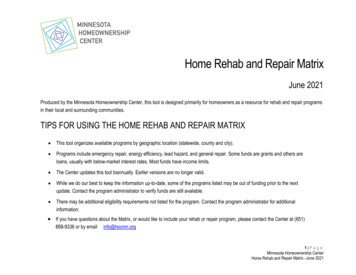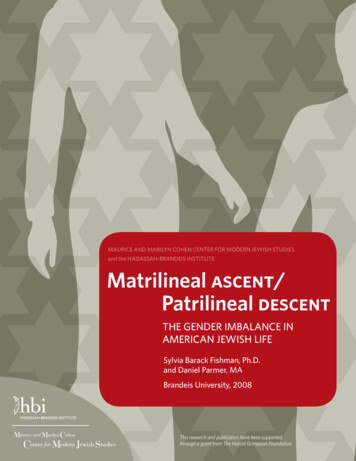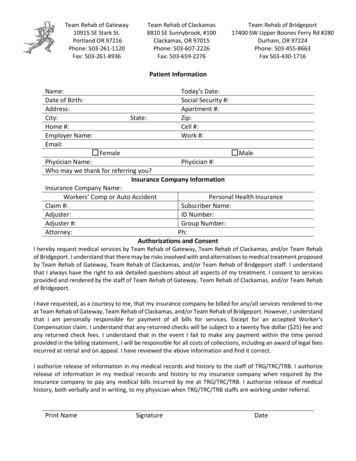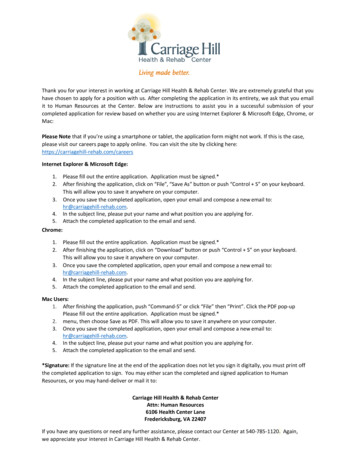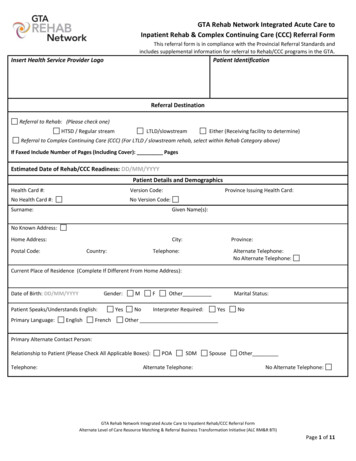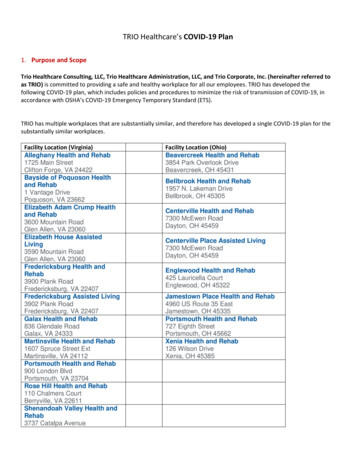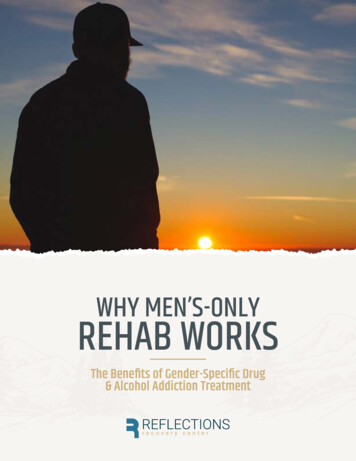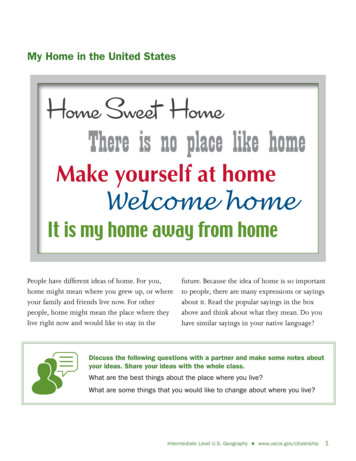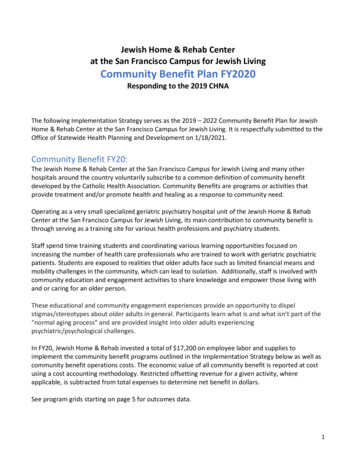
Transcription
Jewish Home & Rehab Centerat the San Francisco Campus for Jewish LivingCommunity Benefit Plan FY2020Responding to the 2019 CHNAThe following Implementation Strategy serves as the 2019 – 2022 Community Benefit Plan for JewishHome & Rehab Center at the San Francisco Campus for Jewish Living. It is respectfully submitted to theOffice of Statewide Health Planning and Development on 1/18/2021.Community Benefit FY20:The Jewish Home & Rehab Center at the San Francisco Campus for Jewish Living and many otherhospitals around the country voluntarily subscribe to a common definition of community benefitdeveloped by the Catholic Health Association. Community Benefits are programs or activities thatprovide treatment and/or promote health and healing as a response to community need.Operating as a very small specialized geriatric psychiatry hospital unit of the Jewish Home & RehabCenter at the San Francisco Campus for Jewish Living, its main contribution to community benefit isthrough serving as a training site for various health professions and psychiatry students.Staff spend time training students and coordinating various learning opportunities focused onincreasing the number of health care professionals who are trained to work with geriatric psychiatricpatients. Students are exposed to realities that older adults face such as limited financial means andmobility challenges in the community, which can lead to isolation. Additionally, staff is involved withcommunity education and engagement activities to share knowledge and empower those living withand or caring for an older person.These educational and community engagement experiences provide an opportunity to dispelstigmas/stereotypes about older adults in general. Participants learn what is and what isn’t part of the“normal aging process” and are provided insight into older adults experiencingpsychiatric/psychological challenges.In FY20, Jewish Home & Rehab invested a total of 17,200 on employee labor and supplies toimplement the community benefit programs outlined in the Implementation Strategy below as well ascommunity benefit operations costs. The economic value of all community benefit is reported at costusing a cost accounting methodology. Restricted offsetting revenue for a given activity, whereapplicable, is subtracted from total expenses to determine net benefit in dollars.See program grids starting on page 5 for outcomes data.1
2019 - 2022 Implementation StrategyIntroduction & PurposeJewish Home & Rehab Center at the San Francisco Campus for Jewish Living, which operates anonprofit acute geriatric psychiatry hospital, is pleased to share its Implementation Strategy. Thisdocument follows the completion of its 2019 Community Health Needs Assessment (CHNA). Inaccordance with requirements in the Affordable Care Act and IRS 990 Schedule H requirements, thisplan was reviewed by the Board and approved by a designated representative on March 25, 2020.This report summarizes the plan to develop and/or collaborate on community benefit programs thataddress at least one of the prioritized health needs identified in the 2019 CHNA. The prioritized healthneeds include: 2019 CHNA Prioritized Health NeedsPriority 1: Access to coordinated, culturally and linguistically appropriate care andservices*Priority 2: Food security, healthy eating and active livingPriority 3: Housing security and an end to homelessnessPriority 4: Safety from violence and traumaPriority 5: Social, emotional, and behavioral health*Abbreviated as “Access to Care and Services” in remainder of documentJewish Home & Rehab Center at the San Francisco Campus for Jewish LivingMissionEnriching the quality of life of older adults.VisionTo become a regional resource as an integral part of a continuum of care throughout the Bay Area thatprovides senior adults with a variety of life enriching programs and services that are accessible,promote individual dignity, encourage independence, connect them to their community, and reflectthe social, cultural, and spiritual values of Jewish tradition.The Jewish Home & Rehab Center at the San Francisco Campus for Jewish Living is a nonprofitorganization that includes three specialized units: Short-Term Rehabilitation Units Alzheimer's Garden Unit Acute Geriatric Psychiatry Hospital (DBA Jewish Home & Rehab Center)The hospital is a licensed 13-bed gero-psychiatric inpatient unit devoted to providing behavioral healthservices exclusively designed for older adults suffering from acute psychiatric disorders. These patientsin acute psychiatric crisis require a safe environment, a structured and supportive social milieu, and aneffective treatment program. Through an interdisciplinary team approach the hospital accessesdifferent professional and skill groups in real time and are thus able to respond rapidly to patients’changing needs. The small size of the program allows the hospital to truly individualize care to supportthe health and goals of the patient.2
The hospital addresses the needs of the whole person, not just their psychiatric or mental illness. Thefollowing services are offered: 24-hour nursing care and services Medical assessment and continuing care by geriatricians Physical, occupational and speech therapy evaluations Daily appointments with specially trained geriatric psychiatrists for therapeutic intervention, aswell as medication management Recreation therapy to support emotional wellbeing and coping skills Social work services to encourage stability during the patient’s stay, as well as their continuedcare and community connection upon dischargeAdditionally, the social work team’s responsibilities extend beyond the patient, connecting with thepatient’s family and friends, case manager, and outside medical providers. The social work teamgathers the patient’s past hospitalization records, medical data, and collateral, so that theinterdisciplinary group has the most accurate information.During a patient’s stay, the hospital team collaborates with other community-based providers on asteady basis — from communicating prior to admission with medical professionals and outpatientservices received in the past, to making sure patients are discharged with the highest level of servicesavailable to them. The social services department connects patients with outpatient services, including(but not limited to) partial hospital programs, intensive outpatient programs, home health services,housing services, medical appointments, psychiatric referrals, therapy services, and transportationservices, as well as community programs such as senior centers and socialization programs.CHNA OverviewThe City and County of San Francisco CHNA is conducted by the health department and overseen bythe San Francisco Health Improvement Partnership (SFHIP), a multisector collaboration that includesSan Francisco Hospitals. The most recent CHNA, completed in May 2019, serves as the common basisfor all San Francisco Hospitals, including Jewish Home & Rehab Center at the San Francisco Campus forJewish Living.Jewish Home & Rehab Center at the San Francisco Campus for Jewish Living has supplemented theSFHIP CHNA with its own assessment of needs due to the highly specialized population served by thehospital. It also takes into consideration that many of the patients served the hospital come fromgeographical areas outside of San Francisco. Jewish Home & Rehab Center at the San Francisco Campusfor Jewish Living enhanced its own knowledge and understanding of community needs beyond theSFHIP CHNA through the completion of a literature review focused on older adult populations and byconducting key informant interviews with local experts. Collectively, the interview participants haveextensive experience and a long history of serving older adults with mental health disorders across thesocioeconomic spectrum. This includes people of all genders and from all racial/ethnic backgrounds.Jewish Home & Rehab Center at the San Francisco Campus for Jewish Living engaged with FacenteConsulting to assist with the literature review, key informant interviews, and preparation of thesupplemental CHNA. Kaiser Permanente and UCSF, two partners of this hospital also collaborated onthe needs assessment.3
Implementation Strategy Design ProcessJewish Home & Rehab Center at the San Francisco Campus for Jewish Living contracted with ConduentHealthy Communities Institute (HCI) to facilitate the Implementation Strategy process. HCI convenedthe hospital’s leaders to review the priority health needs identified during the CHNA process and cometo agreement on an Implementation Strategy outline.Taking into consideration input from the key informant participants from the community in the CHNAprocess and its own resources and expertise, Jewish Home & Rehab Center at the San FranciscoCampus for Jewish Living used an inventory of existing and planned programs to narrow its focus toaddressing Access to Care and Services. Leaders from Jewish Home & Rehab Center at the SanFrancisco Campus for Jewish Living then worked with HCI to complete this report.Implementation StrategyThe Implementation Strategy outlined on the following pages summarizes the strategies and activitiesthat will be taken on by Jewish Home & Rehab Center at the San Francisco Campus for Jewish Living toaddress Access to Care and Services, which was identified as a priority in the CHNA process.The following components are included in the program grids below: Actions the hospital intends to take to address the health need identified in the CHNA Anticipated impact of these actions Outcome measures for each activity Resources the hospital plans to commit to each strategy Any planned collaboration to support the work describedIt should be noted that no one organization can address all the health needs identified in itscommunity. Jewish Home & Rehab Center at the San Francisco Campus for Jewish Living is committedto serving the community by adhering to its mission, and using its skills, expertise and resources toprovide a range of community benefit programs to address Access to Care and Services. Due to limitedresources and/or expertise, this Implementation Strategy does not include specific plans to addressother prioritized health needs including: Food Security, Healthy Eating and Active Living; HousingSecurity and an End to Homelessness; Safety from Violence and Trauma; Social, Emotional andBehavioral Health.COVID-19 ConsiderationsThe COVID-19 global pandemic declared in early 2020 has caused extraordinary challenges for healthcare systems across the world including the Jewish Home & Rehab Center’s acute psychiatric hospital.Keeping front line workers and patients safe, securing protective equipment, developing testingprotocols and helping patients and families deal with the isolation needed to stop the spread of thevirus all took priority as the pandemic took hold.Some of the community benefit strategies noted in this implementation strategy have beentemporarily paused or adjusted to comply with current public health guidelines to ensure the healthand safety of those participating.4
Jewish Home & Rehab Center at the San Francisco Campus for Jewish Living: Implementation Strategy ActionPlanPRIORITY: ACCESS TO COORDINATED, CULTURALLY AND LINGUISTICALLY APPROPRIATE CARE AND SERVICESGoal Statement: Share knowledge and provide training in support of increasing psychiatric resources for older adults and dispelling the societalstigma associated with psychiatric need.Objective: By June 30, 2022 train four geriatric psychiatry studentsStrategy 1: Serve as a training site for future geriatric psychiatristsPrograms/ActivitiesActivity 1.A) Didactic lectures anddiscussions on relevant patientdiagnoses, treatments and medicationsActivity 1.B) InternshipsEvaluationDataMeasuresSource# of lectures Internal# ofstudentsInternalBaselineOutcomes Y1Outcomes Y2Outcomes Y3July 2019 – June 2020July 2020 – June 2021July 2021 – June 20222 lectures held2 Geriatric PsychFellows in place untilMarch 2020 - programsuspended due topandemic32 patient reviewsconductedActivity 1.C) Clinical review of patients# of clinicalInternalreviewswith geriatric psychiatristsAnticipated Outcomes: More psychiatric resources available in Northern CaliforniaTarget Population(s): Third year psychiatry studentsResources: (financial, staff, supplies, in-kind etc.) Year 1: Staff time to coordinate the program, physician time for classroom education, physician time for on the floor training with patients Year 2: Staff time to coordinate the program, physician time for classroom education, physician time for on the floor training with patients Year 3: Staff time to coordinate the program, physician time for classroom education, physician time for on the floor training with patientsCollaboration Partners: University of California, SF Department of Psychiatry California Pacific Medical Center Residency Program5
PRIORITY: ACCESS TO COORDINATED, CULTURALLY AND LINGUISTICALLY APPROPRIATE CARE AND SERVICESGoal Statement: Share knowledge and provide training in support of increasing psychiatric resources for older adults and dispelling the societalstigma associated with psychiatric need.Objective: By June 30, 2022 implement a nurse internship program and train four nursesStrategy 2: Develop and implement a nurse internship neActivity 2.A) Develop internship wProgramDeveloped psychiatricnursing corecompetencies forcurrent employeesthat will beincorporated intoNursing Internshipprogram. Placed onhold due to pandemicbeginning 3/2020Activity 2.B) Educate hospital nurses informalized preceptor program# of nurseseducatedInternalNewProgramActivity 2.C) Outreach and recruitmentfor possible nurse interns# ofoutreachevents# of internsPreceptor programdeveloped by JHNursing EducationDept; one APU RNattended preceptorprogramPlaced on hold due topandemic beginning3/2020NewProgramOutcomes Y1Outcomes Y2Outcomes Y3July 2019 – June 2020July 2020 – June 2021July 2021 – June 2022Anticipated Outcomes: Nurse internship program in place and 4 nurses trained and working in the field of geriatric psychiatryTarget Population(s): Third year nursing studentsResources: (financial, staff, supplies, in-kind etc.)6
Year 1: Staff time to develop, promote and coordinate the program Year 2: Classroom training of interns, nurse time for training interns Year 3: Classroom training of interns, nurse time for training interns with patientsCollaboration Partners: San Francisco State Nursing School University of San Francisco7
PRIORITY: ACCESS TO COORDINATED, CULTURALLY AND LINGUISTICALLY APPROPRIATE CARE AND SERVICESGoal Statement: Share knowledge and provide training in support of increasing psychiatric resources for older adults and dispelling the societalstigma associated with psychiatric need.Objective: By June 30, 2022 engage with five community organization to provide ten community outreach activitiesStrategy 3: Provide community outreach to dispel stigma associated with psychiatric needPrograms/ActivitiesActivity 3.A) Research communityoutreach programs/events for the seniorcommunityActivity 3.B) Create outreach plan tosecure presentation opportunities atpublic events focused on seniors/theircaregiversActivity 3.C) Present mpletedOutreachplan in place# ofpresentations# of peoplereachedDataSourceBaselineOutcomes Y1Outcomes Y2Outcomes Y3July 2019 – June 2020July 2020 – June 2021July 2021 – June 2022No communityoutreach activitiesscheduled for 2020,unable to coordinatedue to pandemicbeginning March 2020N/A due to pandemicbeginning March 2020N/A due to pandemicbeginning March 2020Anticipated Outcomes: Enhanced relationships with community organizations serving seniors and/or their caregivers, and increased availability of information to help dispelstigma associated with psychiatric needTarget Population(s): Seniors, their families and senior caregiversResources: (financial, staff, supplies, in-kind etc.) Year 1: Staff time for research and outreach plan Year 2: Staff time and materials for presentations and outreach efforts Year 3: Staff time and materials for presentations and outreach effortsCollaboration Partners: To be determined8
PRIORITY: ACCESS TO COORDINATED, CULTURALLY AND LINGUISTICALLY APPROPRIATE CARE AND SERVICESGoal Statement: Share knowledge and provide training in support of increasing psychiatric resources for older adults and dispelling the societalstigma associated with psychiatric need.Objective: By June 30, 2022 expand current training options from one Social Worker and one Recreational Therapist to two Social Workers, twoRecreational Therapists, and two Occupational TherapistsStrategy 4: Provide training to professionals in the areas of social work, recreational therapy and occupational therapy to increase services for olderpsychiatric patientsPrograms/ActivitiesEvaluation DataBaselineOutcomes Y1Outcomes Y2Outcomes Y3July 2019 – June 2020July 2020 – June 2021July 2021 – June 2022MeasuresSourceActivity 4.A) Program promotion andOutreachplan inoutreachplaceActivity 4.B) Classroom training# ofInternal2 SW interns internedstudentsfor 16 hours each pertrained /2week from 1/20203/2020 on the unitActivity 4.C) Floor training# ofstudentstrained/ 2Internal1 recreationaltherapist internedfrom 1/2020 – 3/2020SW interns received 2hours/wk ofsupervision per internby APU Director of SSand Program DirectorRecreational TherapistinternAnticipated Outcomes: 2 social workers, 2 recreational therapists, 2 occupational therapists trained in caring for older psychiatric patientsTarget Population(s): Students from community and regional educational institutions in the areas of social work, recreational therapy and occupational therapyResources: (financial, staff, supplies, in-kind etc.) Year 1: Staff time to promote and coordinate the program; staff/clinician time to train students9
Year 2: Staff time to promote and coordinate the program; staff/clinician time to train students Year 3: Staff time to promote and coordinate the program; staff/clinician time to train studentsCollaboration Partners: San Francisco State University10
Jewish Home & Rehab Center at the San Francisco Campus for Jewish Living Community Benefit Plan FY2020 Responding to the 2019 CHNA The following Implementation Strategy serves as the 2019 - 2022 Community Benefit Plan for Jewish Home & Rehab Center at the San Francisco Campus for Jewish Living. It is respectfully submitted to the
